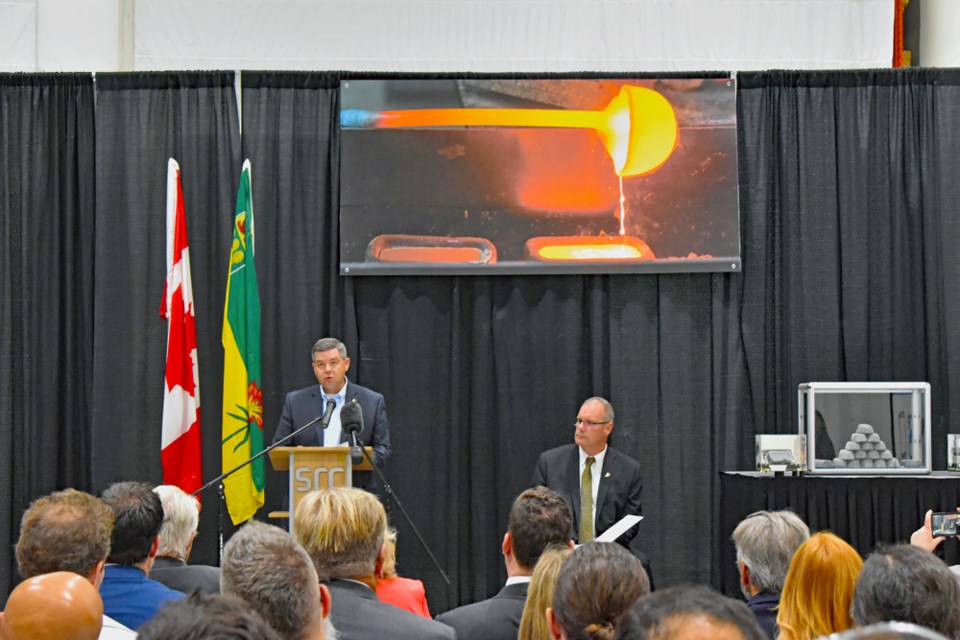SASKATOON — Saskatchewan is looking to capitalize on the increasing demand for rare earth minerals with the processing facility that could produce tons of metal ingots expected to be operational in 2024.
China is currently the leading producer of rare earth metal ingots with about 90 per cent being manufactured in the world’s second-largest economy. These ingots are used to manufacture permanent magnets which are used in electric vehicles, wind turbines and other electronics.
Saskatchewan is hoping to change that since the province is among the four jurisdictions in the world that have the capability to produce ingots from rare earth minerals, something the provincial government wants to capitalize on, according to Minister Jeremy Harrison.
“That means, as a province, we’re going to be positioned in a very good place to advance this industry, which has importance beyond our borders… We are now going to have the capacity, in the province, to produce these [rare metal ingots],” said Harrison.
“There is remarkable interest in what we are doing here and I think we’re going to see some of that interest manifested [shortly] … We’ve been talking about this project globally, through both the Saskatchewan Research Council and trade and export development.”
Harrison, the minister responsible for SRC, was presented by SRC president Mike Crabtree with the first rare earth metal ingots that were produced in Canada on Friday, Aug. 26, near the SRC’s processing facility that is targeted to be fully operational in 2024.
Crabtree said the facility will be north of their compound is a 40,000-square-foot building that is currently being fitted out with the first phase of the development with two more facilities — another 40,000-sq. ft and 20,000 sq. ft — for the next two phases of the project.
“We will have initial production in 2023 and then full production of the magnet metals in about fall of 2024 … We will be looking to take in about 3,000 tons of monazite oar and process that through 1,500 tons of rare earth [minerals],” said Crabtree.
“From these rare earth [minerals] produced, they are used in a variety of technologies. The ingots are then converted into the magnets that are used in Teslas or even Ford. So, all the electric vehicles.”
He added that rare earth ingots are an important piece of the renewable energy industry as it is dependent on large quantities of the material. Cameras, mobile phones, and laptop computers also have sensors that require magnet materials sourced from rare earth ingots.
Harrison said the production of ingots from rare earth minerals would increase jobs in the province and an added boost to the economy.
“We are confident this is going to create hundreds of jobs in the long term. If not even more over the course of the development of this industry. That’s really what we are doing, we are creating an industry that otherwise would not have been created,” said Harrison.
“We do have the talent here at [SRC] but also we have an incredibly well-developed mining supply chain here in Saskatchewan that has given us a comparative and competitive advantage in producing [these ingots].”
He added that one bar of the rare earth mineral ingot cost from $500 to $600 in the world market making it a great revenue opportunity for the province with Saskatoon set to become the hub for the production of rare earth metal ingots in North America.
In June 2022, the Government of Saskatchewan announced an additional $20 million in funding for the Facility and its capabilities and move further down the rare earth element value chain with the addition of a metals smelting unit that will produce these ingots.
The fully integrated, three-stage Rare Earth Processing Facility will be the first-of-its-kind in North America and will be producing REE products for sale in the international market in 2024, including individual rare earth oxides and didymium metals.
SRC is Canada's second largest research and technology organization. With 350 employees, $275 million in annual revenue and 75 years of experience, SRC provides services and products to its 1,400 clients in 25 countries around the world.





